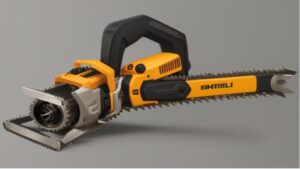
A small gas chainsaw can be a versatile and powerful tool for homeowners, DIY enthusiasts, and professionals alike. Whether you need to trim branches, cut firewood, or tackle larger projects, choosing the right small gas chainsaw is crucial. In this comprehensive guide, we’ll walk you through the essential factors to consider when selecting the best small gas chainsaw for your needs.
1. Determine Your Needs
The first step in choosing the right small gas chainsaw is to assess your specific needs. Consider the types of tasks you’ll be using the chainsaw for and the frequency of use. Small gas chainsaws typically range from 30cc to 45cc, with larger options available for more demanding jobs. Select a chainsaw size that matches your intended applications.
2. Bar Length
The length of the chainsaw’s guide bar is a critical factor. Smaller gas chainsaws typically have bar lengths between 12 to 16 inches. Choose a bar length that is suitable for the diameter of the wood you’ll be cutting. Longer bars are ideal for larger trees and logs, while shorter bars are more manageable for smaller tasks.
3. Engine Power
The power of the chainsaw’s engine is measured in cubic centimeters (cc). A higher cc rating generally means more power. Consider the power you need for your specific tasks. Smaller engines (around 30cc) are suitable for light pruning and cutting small logs, while larger engines (45cc or more) are better for heavier-duty work.
4. Weight and Portability
Portability is essential, especially for small chainsaws intended for homeowner use. Lightweight chainsaws are easier to handle and maneuver. Look for a balance between power and weight to ensure that the chainsaw is manageable for your needs.
5. Safety Features
Safety should be a top priority when selecting a small gas chainsaw. Look for features like a chain brake, which stops the chain in case of kickback or other emergencies. Anti-vibration features can also reduce operator fatigue and improve safety during extended use.
6. Easy Maintenance
Maintenance is a crucial aspect of chainsaw ownership. Consider a chainsaw with features that make maintenance tasks like chain tensioning and cleaning more accessible. Accessible air filters and tool-free chain tensioning systems can save you time and effort.
7. Brand and Reputation
Choose a well-established and reputable brand when purchasing a small gas chainsaw. Trusted manufacturers often provide better warranties, customer support, and readily available replacement parts. Reading customer reviews and seeking recommendations can help you make an informed decision.
8. Budget Considerations
Gas-powered chainsaws come in various price ranges. While it’s tempting to choose the most affordable option, consider your needs and how often you’ll use the chainsaw. Investing in a higher-quality chainsaw with durable components may pay off in the long run.
9. Noise and Emissions
Gas chainsaws can be noisy and emit exhaust fumes. If noise levels and emissions are a concern, consider models designed to reduce these effects. Some chainsaws come with noise-reducing technology and environmentally friendly engine options.
In conclusion, selecting the best small gas chainsaw involves assessing your needs, considering factors like engine power, bar length, weight, safety features, and maintenance ease, and choosing a reputable brand within your budget. By carefully evaluating these factors, you can ensure that your small gas chainsaw is a reliable and efficient tool for your outdoor projects.
Investing in the right small gas chainsaw can make your outdoor tasks more efficient and enjoyable while maintaining safety and ease of use.
